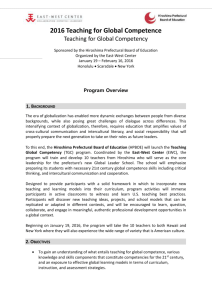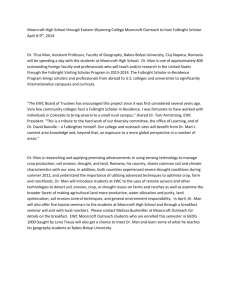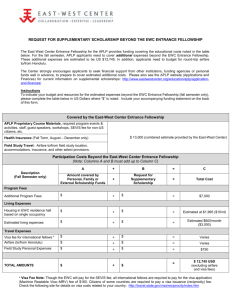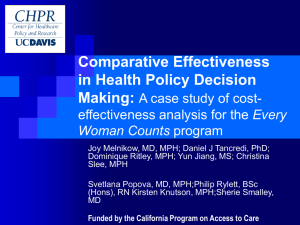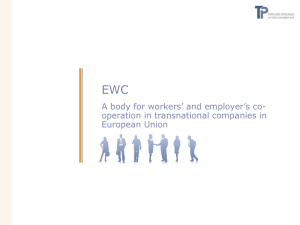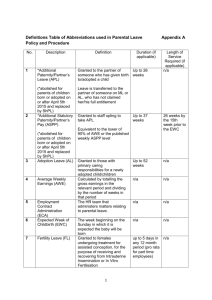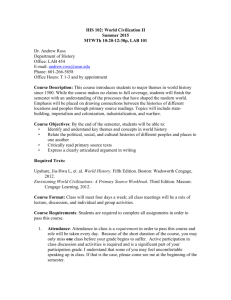EWC case studies
advertisement
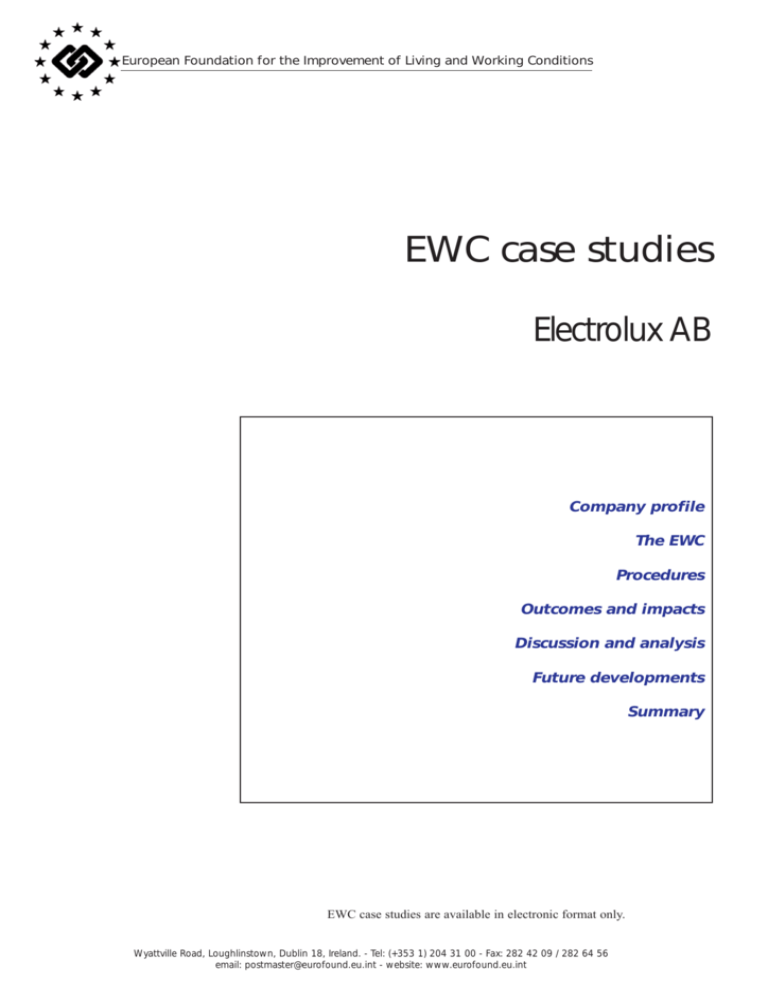
European Foundation for the Improvement of Living and Working Conditions EWC case studies Electrolux AB Company profile The EWC Procedures Outcomes and impacts Discussion and analysis Future developments Summary EWC case studies are available in electronic format only. Wyattville Road, Loughlinstown, Dublin 18, Ireland. - Tel: (+353 1) 204 31 00 - Fax: 282 42 09 / 282 64 56 email: postmaster@eurofound.eu.int - website: www.eurofound.eu.int Company profile Electrolux AB is a Swedish-based and global consumer products company. Its main product areas are white goods (refrigerators, washing machines, etc.), vacuum cleaners, chain saws, lawnmowers and other advanced gardening products. Through acquisitions, especially in the 1980s and 1990s, Electrolux is now a multi-brand company well known for names such as Electrolux, AEG, Zanussi, Husqvarna, Eureka and Partner. The company’s annual turnover is around EUR 15 billion (2001), of which European sales account for about 47%, North American about 39% and the rest of the world 14%. In Europe the major production facilities are based in Italy, Sweden and Germany, and in a number of other countries including Hungary and Romania. The total number of employees is over 80,000 throughout the world – with over 60% in Europe, under 30% in North America and just above 10% in the rest of the world. The workforce’s gender distribution is 70% men and 30% women. Between 1991 and mid-2005 the number of employees went down from 130,000 to 80,000. Electrolux AB is listed on the stock market in London, Stockholm, Paris, Zurich and the Nasdaq. Swedish investors hold 60% of the shares – the Wallenberg Group (an important Swedish industrialist family) has a major shareholding. Electrolux AB was established in 1919 through the merger of two small Swedish companies, Elektromekaniska and Lux. Based on the production of vacuum cleaners and refrigerators under the management of the major shareholder Axel Wenner-Gren, Electrolux developed a leading position in household products in Sweden. In the 1950s and 1960s Electrolux strengthened its position by buying other Swedish companies such as Husqvarna and ElektroHelios which are still important brands in the company. During this period it also expanded outside Sweden by establishing or acquiring production companies in South America as well as Scandinavia. The company’s global expansion started in earnest in 1974 when it acquired the leading North American vacuum cleaner company Eureka. Growth continued during the 1980s and 1990s by the acquisition of, among others, Zanussi in 1984, the leading white goods company in Italy, Paris-Rhone (France) in 1981, Thorn-EMI in the UK in 1987, household products from the AEG-group in Germany, white goods and a number of companies in the US: DuoTherm, Poulan/weedeater, Frigidaire, Partner and Seitz. This rapid global expansion led to a more diverse structure and product mixes, with loss of profit as a major challenge. In 1998 the new management launched a restructuring plan to increase efficiency and lower costs, based on defining core activities and products and streamlining production flow. Over 14 operations were disposed of involving more than 22,000 employees worldwide. The present development strategy for the company builds mainly on: a yearly growth of EUR 100 million mainly through organic growth, increased product development and innovations like intelligent homes, design and function, environmental efficiency and low operating costs, customer orientation and marketing focused on the most value-generating brands, and to some extent continuous acquisitions; increasing cost reductions and efficiency in the use of resources through establishing a new pan-European structure, efficiency in the production and distribution flows, lowering costs on sales and administration, new products and product platforms, out-sourcing and purchasing efficiency. © European Foundation for the Improvement of Living and Working Conditions, 2005 1 EWC case studies Six common processes for internal development are defined for the entire organisation: Branding strategies Product development (consumer surveys, generation planning) Coordination and standardisation in the support functions Integrating the flows of products and information between the group, suppliers and re-sale Purchasing coordination and optimisation Personnel policies and procedures (attractiveness, talent management, value-based reward systems) 1 For the European operations recent years have brought major changes based on reducing costs and complexity. In 2001 2 three production plants were closed. Product development was concentrated on major plants and centralised in Brussels. The present organisation is based on two business areas: consumer and professional and indoor and outdoor products in both areas. For development activities and managerial structure there is also a clear division between North America and Europe. The EWC The agreement of the Electrolux European Works Council (EWC) was signed in accordance with Article 13 on 3 February 1995 and renewed on 23 March 2001, and is valid through to 2007. The general outline of the agreement is: …to provide information and the opportunity for exchange of views …on significant issues of a transnational nature. In doing so, it is hoped that an organisation with a truly international perspective can be developed where diversity is seen as an asset and to help sustain an environment which respects transparency and offers fairness of dealing for all the people working in the organisation ... (1.1) The discussion must continually reflect the context, heritage, culture, competitive position and evolving organisation of the Electrolux Group ... the key to employment relationships which is that between the individual team member and his local operating unit ... (1.2) the structure should not encroach onto those subjects which are best discussed at local level. (1.3) The content of the EWC is described as: a constructive exchange of views on matters related to the group’s industrial, economic, commercial, financial, technological, structural and human resource matters ... (2.2). Any subjects related to an individual business unit or country will not be the subject of debate.(2.4). Issues related to remuneration, compensation, benefits or terms and conditions of employment will be excluded ... (2.5) 1 2 2 MD Michael Treschow in the 2000 annual report Annual report 2001 © European Foundation for the Improvement of Living and Working Conditions, 2005 Electrolux AB The EWC consists of the following representatives, based on the number of employees exceeding 500: EWC Country Employees EWC Country Employees 3 Italy 11400 1 Switzerland 1000 2 Sweden 6600 1 Austria 900 2 Germany 5700 1 Belgium 800 1 Spain 3000 1 Hungary >500 1 United Kingdom 2300 1 Netherlands 450 1 France 2200 1 Norway 350 1 Denmark 2000 1 Finland 320 1 Romania 1100 1 Ireland 140 Representatives for Portugal, Greece and Luxembourg are also formal members but have not attended meetings. The meetings of the EWC are normally held once a year, if not summoned by a special occasion. The meeting consists of a one or two-day pre-meeting for the employee representatives followed by the real EWC meeting for one and a half days and then a half-day summary meeting for the employee representatives. In order to achieve a more efficient, continuous dialogue with management and to administrate and prepare the EWC meetings, a steering group is stipulated in the agreement, consisting of three representatives from management and three from the employee side. A general secretary is chosen from management to take responsibility and use the group’s competence in the most efficient way. It normally meets four to five times a year. The origin of the steering group is a positive outcome from the small cooperative body created to audit the large restructuring process between the years 1997 and 2000. The steering group jointly decides the agenda of the EWC meeting with suggestions beforehand from the EWC representatives. The content of the meetings is agreed 60 days before the meeting between the steering committee and management and its final agenda is fixed one month before the meeting. Two external advisors are used to assist the employee representatives in the EWC and especially the steering group – currently one European confederation official (EMF) and one Swedish (Metal Workers’ Union). Their main area of advice is labour, economy and employment. The main issues dealt with in the EWC meetings are the company’s strategic development and restructuring issues. The meeting normally follows an agenda consisting of: information from the MD of the group; information from the presidents of the business sectors and (if relevant) heads of staff functions; questions from employee representatives. Almost at the start of the EWC the Electrolux Group went into a major restructuring process on which the EWC and a smaller group became important tools for dialogue between management and employee representatives. Recent meetings have been focused on continuous change in European Electrolux Home Products as well as problems on manufacturing and divestments taken up by employee representatives. A code of conduct on social and environmental issues has also been discussed. © European Foundation for the Improvement of Living and Working Conditions, 2005 3 EWC case studies Procedures The Electrolux EWC had been running for more than five years when the agreement was amended in 2001. This was mainly a confirmation of the procedures developed during the early years, for instance on the role of the steering committee. Interaction between employee representatives and group management The procedures of the EWC can be seen as a combination of: preparation, holding formal meetings and passing on information from them; continuous meetings between top management and major employee representatives on the steering group; informal contacts, telephone meetings, and email communication between members of the steering group and management on the one hand and steering group representatives and the rest of the EWC on the other. Preparation of EWC meetings has been developed over the years. Normally the agenda is prepared jointly with the steering group. In this way they also decide who should be present from management. The EWC representatives get information beforehand including minutes from continuous steering group meetings. During the pre-meeting, there are reports from each country as well as preparation of questions for the management meeting. Sometimes there are lectures or training – often on the economy and market issues, such as branding; the meeting is then expanded from one to two days. Meetings On the EWC meeting itself the MD of the group always attends and gives a general view of the group’s development. Business area managers also provide information, and sometimes the HR manager gives a general statement on HRI issues. Talent management and a social code of conduct are two issues that have been addressed. Special questions from the EWC representatives have then been taken up. The strategy from management is to inform as much as possible, even on issues that might go beyond a more strict interpretation of the agreement. An important part of the EWC meeting is a joint dinner with the option of more informal discussions. The minutes of the meetings are drawn up by the general secretary, agreed by the steering group and circulated to representatives. They are also available on the group intranet. The steering group has played an increasingly important part in the process. It started as a joint party surveillance group for the restructuring process – really on the initiative of top management. Within the framework of the steering committee there is a continuing discussion between representatives and management. Representatives in the group are also in continuous contact with other EWC representatives when issues arise that need their joint attention. The restructuring process illustrates a very systematic way of communicating major changes. The establishment of the EWC coincided with the ambition of the top management to launch a large restructuring programme in the group. Management evidently saw the possibility of using the EWC as an arena for information and the exchange of views on the change process – not negotiation but consultation. When the restructuring plans were made public they were first given to the EWC, and subsequently locally and to the press. There was some leakage of information, but not too serious, and the confidentiality of the EWC is now undisputed. 4 © European Foundation for the Improvement of Living and Working Conditions, 2005 Electrolux AB Overall issues and transnational relocations etc. were discussed in the steering group and items of potential conflict dealt with. The negotiation procedures were handled throughout at the local level. Meetings were sometimes arranged between top management and local employee representatives. Though the process of restructuring was troublesome for many of those involved, the overall experience has been positive. With downsizing and relocation there are almost always winners and losers. The openness and readiness for dialogue seem to have created a climate of understanding on the necessity of the actions taken even though there was some frustration at local level. The restructuring process at Electrolux is seen as a successful one in terms of EU level social dialogue. Outcomes and impacts Employees From the employee representatives you can identify some dissatisfaction with the outcome – more related to the expectations of the EWC as something more than merely an arena for information and exchange. These expectations and perceptions of outcomes differ between different unions and employee representatives. Generally speaking the Swedes did not have high expectations. Through the cooperative system they already had a lot of information and informal relations for influencing group management. They see positive outcomes for the other countries with weaker systems of influence – employees gaining information and relations they did not have before. The Italian employees, on the other hand, seem not to share this view, mainly because of their higher expectations of the EWC as a vehicle to influence company decisions. They get more information – but are uncertain of how to act on it. Management Management in general seem to look on the outcomes as positive. They consider that the EWC fulfils a role in the managing of human resources, of sharing information and in broadening the company culture. The MD, for instance, sees and talks to people he otherwise would not. It opens channels and has an impact on corporate value. From a managerial point of view it is working even better than stipulated in the agreement, mainly through the process of building relationships and trust. It also seems evident that the perception of the EWC becomes less positive at the lower managerial levels. Human resource management and industrial relations As discussed above, the perception of the EWC’s impact on human resources and relations between management and employees largely relates to the expectations of each player. The most evident example of the problems of defining the EWC as a trust-building discussion forum and a forum for negotiation is the issue of the code of conduct. The employee representatives hoped it would raise the possibility of joint decision making and saw the code of conduct as a good starting point. This code of conduct was originally initiated by the group in order to fulfil public and consumer demands on Electrolux to fulfil at least a minimum standard on social issues such as child labour, minimum wages and union rights worldwide. When this appeared as an information issue on the agenda, the reaction from the council was that it should be a joint issue between the group and the EWC. Management took the view that they were not ready for this development. © European Foundation for the Improvement of Living and Working Conditions, 2005 5 EWC case studies Arguments, among others, were or could have been that the code: was based on international guidelines and conventions (ILO, OECD); originated from external sources (public opinion, customer attitudes); was to be implemented worldwide and not just in Europe. Also some of the areas of the code were on issues that were stipulated not to be the business of the EWC, such as terms of employment. The EWC, and especially its active role in the restructuring process, has had an impact on industrial relations in the group. In Italy you can clearly see a connection between developing local agreements on productivity and flexibility and the discussions in the EWC and among group management on how to restructure the company. Another impact is a rise in the minimum standards of industrial relations throughout the European countries involved – especially important in the new EU states. Discussion and analysis The Electrolux case raises a number of interesting issues concerning the development of the EWC – many about change and restructuring, outsourcing and acquisitions in a transnational environment. Electrolux has a history of growth through acquisitions and has incorporated a number of companies with different national and company cultures that are not totally integrated. In this situation it is of course challenging to launch a very radical structural change, including selling out and dismissing over 20,000 employees worldwide. The management chose to use the EWC actively in this process. The process of transnational restructuring The challenge of getting a joint employee strategy on restructuring when competing for jobs, and using different tools for getting influence is not easy. An open management attitude is and was a prerequisite but was not enough. The transparent process – which every one agrees on – also gave hope of the possibility ‘to make a difference’. For those who lost jobs, however, this was not the case. The process gave them ‘a day in court’ – the right to state their case – but not to really change the strategy. It was very well understood that the real negotiations were to be carried out at national level. It also gave representatives in the steering group continuous information and monitoring of the situation. Through this deep involvement there were enhanced possibilities of informal influence on decisions made and actions taken. This influence is difficult both to measure and to define. The EWC as a body for influence Expectations of the role of the EWC in industrial relations create both frustrations and satisfaction at the concept of the EWC as a body for influence. It is a question of negotiations versus consultations. The management perspective is to use the body for information, discussion and for gaining acceptance. The Swedish/Nordic union perspective could in short be described as developing a minimum standard of union influence all over the group, with local impact and creating a forum for informal contacts with transnational impact. The Italian/southern union perspective is both to have the possibility of raising local issues and to actually influence decisions on a transnational level. From an IR perspective you could see it as a choice between, on the one hand, formal conflict-oriented relations versus informal, cooperative 6 © European Foundation for the Improvement of Living and Working Conditions, 2005 Electrolux AB relations. There is also the difference between dealing with truly transnational issues and using the EWC as a possibility to raise an issue at national level. Putting these two aspects together you get the flowing matrix: Industrial relations strategy level Formal/conflict -oriented Informal/cooperative National/local issues Not an EWC issue – national negotiations Could be raised, listened to but formally dismissed according to the agreement Transnational/European Ambitions from part of the EWC According to the agreement Another problem in defining the EWC’s role is in the area of HR policy. National level negotiations take place for terms of employment, remuneration etc. At the same time the group develops strategies and policies both on a European and a global level. The problem is to take a European HR perspective when: issues of remuneration and terms of employment are excluded from the agreement and national structures and legislation have to be taken into consideration; the group has an interest that goes beyond Europe and the issue is considered as global strategy, as was the case with the code of conduct. Internal procedures The Electrolux EWC has therefore been developing a more important role for the steering group, not just for agenda setting, but also for a continuing dialogue between management and employee representatives. The EWC could be looked upon as a parliament where you can identify the rising importance of government (the steering group) and its procedures – internally and with formal management as well as connections and communications with the greater council. As a consequence of EU enlargement this will be even more obvious. It is also an issue of a more effective and influential structure. The traditional EWC meetings have a pattern of informing (by management) and responding (from the employee representatives) rather than conducting an effective dialogue, while the steering group has a better opportunity. In order to make the dialogue more efficient there are also the problems of knowledge and training, language and economics. Future developments Through the intensive experiences of the EWC in general, and of the restructuring process in particular, the players in Electrolux see two important changes in the future development of the EWC. One is enlargement, where Electrolux already has taken steps to incorporate some of the countries into the EWC (Hungary and Romania). This will help to achieve a smooth process, but might influence the relationship between the steering committee and the now larger EWC – leading to more emphasis on the steering group. The second issue is development of the consultation role in negotiations. The management respondents see this as a probable development, where more soft issues might be considered for negotiations, but there are different opinions among the employee representatives on this. © European Foundation for the Improvement of Living and Working Conditions, 2005 7 EWC case studies Summary The Electrolux case is especially characterised by the following: a company going through major changes – cultural integration, restructuring, relocations and closures; a management active in using the EWC in the change process; a process characterised by building trust through socialisation and developing the consultation role of the EWC; making evident the problems of integrating different unions and of industrial relations. July 2003 EF/05/71/EN - 20 8 © European Foundation for the Improvement of Living and Working Conditions, 2005
